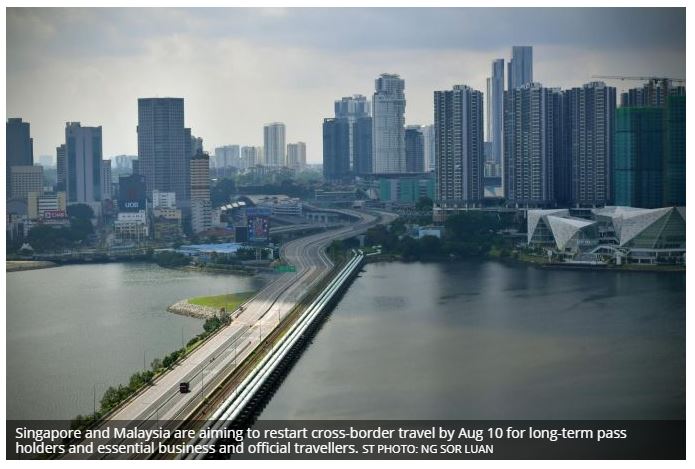Aug 10 target to restart Singapore-Malaysia travel
SINGAPORE and Malaysia are aiming to restart cross-border travel by Aug 10 for long-term pass holders and essential business and official travellers.
While it would bring some relief to Malaysian employees stuck here, and the employers supporting them, industry observers say it won’t be a panacea for all the issues that affected parties are currently struggling with.
Foreign affairs ministries in both countries on Tuesday announced plans to implement a reciprocal green lane and commuting arrangements for long-term pass holders, as well as essential business and official travellers, by Aug 10.
The reciprocal green lane would allow travel for essential business and official purposes between the two countries. Those eligible would have to abide by measures, including taking Covid-19 swab tests and submitting controlled itineraries.
Notably, a periodic commuting arrangement (PCA) would also allow Singapore and Malaysia residents who hold long-term immigration passes for business and work purposes in the other country, to enter that country for work.
After at least three consecutive months in their country of work, they may return to their home country for short-term home leave, and thereafter re-enter their country of work to continue work for at least another three consecutive months. They must also abide by prevailing Covid-19 prevention and public health measures mutually agreed by both countries.
Malaysia and Singapore have also agreed to work on p other schemes, including a daily cross-border commuting proposal for work purposes for travellers from both countries.
Malaysian workers and their employers in Singapore have been in limbo since Malaysia implemented a movement control order (MCO) in March due to the coronavirus pandemic, restricting travel across the Causeway. Malaysia is now in the “recovery phase” of the MCO, till Aug 31.
Companies here initially helped their Malaysian employees with lodging and living provisions, but eventually faced difficulty sustaining them. FairPrice Group, for instance, last month told about 1,000 of its Malaysian employees stuck here that it can no longer sustain the support.
Other companies have also let go of Malaysian staff, media reports have said.
Still, the upcoming commuting arrangements may not help the situation.
Andrew Tay, business development manager at Tay Paper Recycling, noted that while the measures would let workers see their families again, they will still need housing for the months they spend in Singapore. The company has been paying rents for a few apartments for its Malaysian staff since March. It included a meal allowance initially which it has since stopped. “If it’s long-term, we may have to talk to them about co-sharing the accommodation costs,” Mr Tay said.
Operationally, the company may also need to stagger the home leave to avoid running with fewer staff.
Singapore Hotel Association (SHA) executive director Margaret Heng said most member hotels have housed Malaysian employees on-property or at alternative lodgings. However, it’s “not a sustainable solution due to incremental operating costs and the impact on our Malaysian colleagues’ work-life balance”.
And although the PCA offers respite from the current movement control measures, it has financial implications which hotels can “ill afford”. Ms Heng said that besides accommodation costs, measures such as quarantines and swab tests could further strain hotels’ bottomlines.
But SHA is committed to protecting the hotel workforce, of which 25 per cent are Malaysian. “Most of these Malaysian colleagues are highly skilled in the food and beverage and heart-of-the-house operational departments,” she added.
For employees, the situation is unlikely to change too. Aarathi Arumugam, president of the Malaysian Association in Singapore, which has been helping 60 Malaysians financially, said: “(The PCA) does not help to defray employees’ costs; it does not help the fact that people will still have to stay in Singapore, on salaries” that do not support that.
In addition, Malaysians will have to serve stay-home notices in both countries, which is neither beneficial to their employers nor them, as they may end up taking unpaid leave, Ms Arumugam said.
But the new commuting arrangements would free Malaysian employees currently stuck back home to return to work in Singapore, noted the Singapore Precision Engineering and Technology Association (SPETA) and Restaurant Association of Singapore.
SPETA executive director Steven Koh also said it would be ideal if some procedures could be reduced, such as doing swab tests once in either country, although not at the expense of safety.
Source: https://www.sgsme.sg/news/aug-10-target-restart-singapore-malaysia-travel


 English
English




